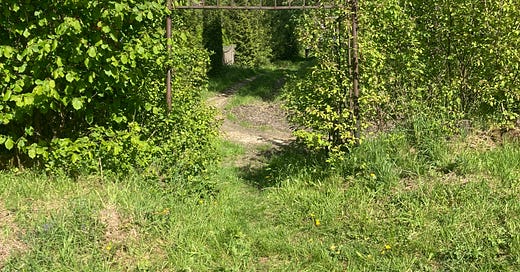Yesterday, I had a chance to regale you with some of my experiences this year. Of course, while traveling I haven’t stopped thinking about the nature of Jewish music and what a meaningful/values-oriented prayer space looks like for me. So, I want to transition this platform into an opportunity to think out loud with each of you about how to respond to this world with love, community, good music, and slowness. And in this vein, I’m transitioning the name of this Substack from Sabbatical Torah to Slow Torah.
SLOW TORAH
What does this name mean, and how will the blog be changing? Glad you asked!
While leading hikes as a Jewish outdoor educator in the forests of Northwest Connecticut, I liked to use the mantra, “We will move at the speed of trust; which is to say, slowly.”
The mantra had a few purposes:
Practical. We were a group of people, varying in age and comfort with being outdoors. We needed the group together, in case there was an educational moment or information that needed to be passed along. And, with only one or two group leaders, we couldn’t keep an eye on everyone if they were too far apart.
Relational. A main reason for these hikes was because it allowed people to bond. People bond when they spend a long time together, doing something challenging. They don’t bond if they begrudge one person for going so far that they walk together.
Beauty. Most group hikes are spent focused on the friends around us and the exercise that we’re getting - nothing wrong with that, but the nature is a beautiful happenstance around us. When we move slowly, we have a chance to notice what we otherwise would miss. I might see a particularly vibrant mushroom, you might (literally) stop and smell the flowers, or we both perk up at a unique bird call. Moving slowly reminds us that we’re not going anywhere, but that we’re exactly where we need to be.
Ecology. When we walk too fast, we’re much more likely to step on something that we didn’t mean to. It is an environmental practice to be able to slow down, and notice what we’re stepping on. This is applicable to innovation as well. On a farm, a tractor will certainly do a job much quicker, and it is guaranteed to destroy the soil’s nutrients in the process.
Trust. The phrase implies that trust operates slowly. When navigating dark and unfamiliar terrain, it’s important to know that we can trust those around us. The “move fast and break things” mentality doesn’t work when you’re operating in a vulnerable space. Instead, we have a chance to see, physically, that we’re all in the work together. If I slip, you’ll catch me, and vice versa.
When applying these rules to Slow Torah to the study of Torah, it is good to remember that any lesson is best learnt when it is applied to your life. You learn a concept, try it out, reflect on your experience, and try again. Torah study, like life, needs to be relational and built on trust. And, it is important to slow down to notice what’s beautiful.
In this blog, I’ll be excavating the concept of slow torah through a wide swath of topics. Slow torah is about living in relationship with those around us, slowing down to redirect our attention to what is inspiring or beautiful, honoring those who came before us, and seeing that everything is interdependent on each other. You’ll see my ponderings as I reintegrate back into New York City in the Fall, you’ll engage with me on current events, and we will study Torah together. Because it’s me, I will interweave my thoughts on Jewish spiritual/communal life, on music, and on climate justice. The next few posts will still include more in-depth retrospectives about the traveling that I did in the past few months. And, I’m also giving myself the permission to take this at the speed that I need to, so that I don’t overwhelm myself and simply stop using the platform.
I hope to model the practice of slow torah in this blog. I guarantee that I will not be perfect. This concept, just like me, is a work in progress. I hope you will join me on this journey of refining what slow torah can look like, and please respond in the comments on Substack or in an email to me to let me know where you see, or wish to see, slow torah show up in your life. I can’t do this work alone, so am grateful whenever I hear from anyone about topics I discuss here.
With that, thank you for continuing with me on this ride. In beginning, we will learn at the speed of trust; which is to say, slowly.



